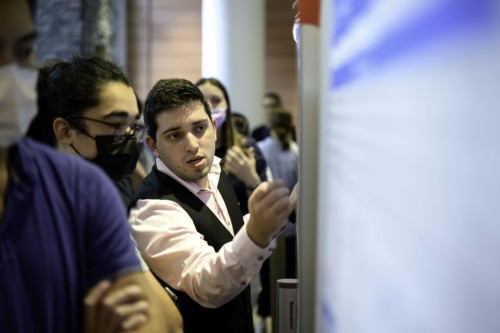Program Overview
Memorial Sloan Kettering and the Gerstner School of Biomedical Sciences are pleased to invite applications for the Engineering and Imaging Summer Program (EISP). EISP is designed to bring together undergraduate rising juniors and seniors interested in engineering, molecular imaging, and/or biomedicine for a summer research experience in labs at Memorial Sloan Kettering that are developing new technologies and techniques to solve fundamental problems in biology and to better understand, diagnose, and treat cancer.
Program Timeline
Nov 3, 2025: Application portal opens
February 2, 2026: Application closes at 8am EST
Offers will be made no later than March 15, 2026
June 1, 2026: Program begins
August 7, 2026: Program concludes
Students who are accepted to EISP will:
- Adapt their skills to address biomedically-focused research questions in cutting-edge laboratories.
- Interact with faculty, postdoctoral fellows, and graduate students.
- Attend scientific presentations by preeminent faculty.
- Attend skills and professional development workshops.
- Attend and present at the summer research symposium at the end of the program.
Students who are accepted into the summer program will be offered a stipend of $6,500 and housing accommodations.
Areas of Research
Students will partner with faculty from Memorial Sloan Kettering who have expressed a strong interest in working with students with engineering and/or imagining research skills. The faculty listed here are conducting research in diverse areas of biomedical sciences. Information about their scientific projects can be found by visiting their respective web pages.
- Animal Models of Disease
- Biomaterials and Nanotechnology
- Cell Engineering/Cell Therapies
- Diagnostics
- Drug Delivery Technology
- Genetic and Tissue Engineering
- Immuno-Engineering
- Magnetic Resonance Imaging
- Nuclear Imaging
- Optical and Acoustic Imaging
- Physical Sciences
- Protein and Molecular Engineering
- Radiochemistry
- Structural Biology
We invite domestic and international* undergraduate sophomores and juniors who are majoring in engineering, physical sciences, computational biology, biology, chemistry, or related fields to apply to EISP.
Applicants should have a minimum GPA of 3.0, have completed some advanced college-level science courses, and have research experience.
In addition to the application form and admission essay, please upload copies of your official transcripts from ALL institutions attended beyond secondary school and that are properly signed and authenticated. Transcripts should be uploaded in the application portal as non-encrypted PDF files. Uploading a transcript with any type of protection or encryption may prevent us from viewing the file and will delay processing of your application.
Two letters of recommendation must also be submitted via our online submission system. These letters should be written by faculty members who are familiar with the student’s academic progress and credentials. Students with research experience must submit letters from their research mentors/advisors.
We invite domestic and international* undergraduate sophomores and juniors who are contemplating a career in biomedical sciences to apply to the Engineering and Imaging Summer Program.
Students interested in applying can complete and submit an application in November 2024.
Applicants should have:
- A minimum GPA of 3.0
- Taken some advanced science courses
- Have an interest in the application of engineering or imaging to biological problems in the laboratory/clinic
- Previous research experience
- If you have any questions or concerns about the program, please contact [email protected].
*Note on International Applicants: The program accepts applications from non-US citizens enrolled in an accredited college or university, but those accepted into the internship will be required to provide evidence of their eligibility to work in the US to participate in the program. You are eligible to apply if you have a student visa (only F-1 or J-1 student visas are acceptable). Student Visas (F-1 and J-1) are provided by the student’s school. The program is not responsible for obtaining the OPT or CPT status- the accepted intern will bear this responsibility.
Frequently Asked Questions
Contact Us
Questions? Contact Program Administrator at [email protected].

